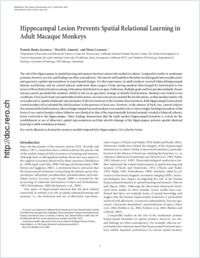Hippocampal lesion prevents spatial relational learning in adult Macaque monkeys
- Lavenex, Pamela Banta Department of Psychiatry and Behavioral Sciences, Center for Neuroscience, California National Primate Research Center, The Medical Investigation of Neurodevelopmental Disorders Institute, University of California, Davis, California - Institute of Physiology, Department of Medicine, University of Fribourg, Switzerland
- Amaral, David G. Department of Psychiatry and Behavioral Sciences, Center for Neuroscience, California National Primate Research Center, The Medical Investigation of Neurodevelopmental Disorders Institute, University of California, Davis, California
- Lavenex, Pierre Department of Psychiatry and Behavioral Sciences, Center for Neuroscience, California National Primate Research Center, The Medical Investigation of Neurodevelopmental Disorders Institute, University of California, Davis, California - Institute of Physiology, Department of Medicine, University of Fribourg, Switzerland
-
2006
Published in:
- The Journal of Neuroscience. - 2006, vol. 26, no. 17, p. 4546-4558
English
The role of the hippocampus in spatial learning and memory has been extensively studied in rodents. Comparable studies in nonhuman primates, however, are few, and findings are often contradictory. This may be attributable to the failure to distinguish between allocentric and egocentric spatial representations in experimental designs. For this experiment, six adult monkeys received bilateral hippocampal ibotenic acid lesions, and six control subjects underwent sham surgery. Freely moving monkeys then foraged for food located in two arrays of three distinct locations among 18 locations distributed in an open-field arena. Multiple goals and four pseudorandomly chosen entrance points precluded the monkeys' ability to rely on an egocentric strategy to identify food locations. Monkeys were tested in two conditions. First, local visual cues marked the food locations. Second, no local cues marked the food locations, so that monkeys had to rely on an allocentric (spatial relational) representation of the environment to discriminate these locations. Both hippocampal-lesioned and control monkeys discriminated the food locations in the presence of local cues. However, in the absence of local cues, control subjects discriminated the food locations, whereas hippocampal-lesioned monkeys were unable to do so. Interestingly, histological analysis of the brain of one control monkey whose behavior was identical to that of the experimentally lesioned animals revealed a bilateral ischemic lesion restricted to the hippocampus. These findings demonstrate that the adult monkey hippocampal formation is critical for the establishment or use of allocentric spatial representations and that selective damage of the hippocampus prevents spatial relational learning in adult nonhuman primates.
- Faculty
- Faculté des sciences et de médecine
- Department
- Département de Médecine
- Language
-
- English
- Classification
- Medicine
- License
-
License undefined
- Identifiers
-
- RERO DOC 5828
- DOI 10.1523/JNEUROSCI.5412-05.2006
- Persistent URL
- https://folia.unifr.ch/unifr/documents/300049
Statistics
Document views: 260
File downloads:
- Texte intégral: 251
